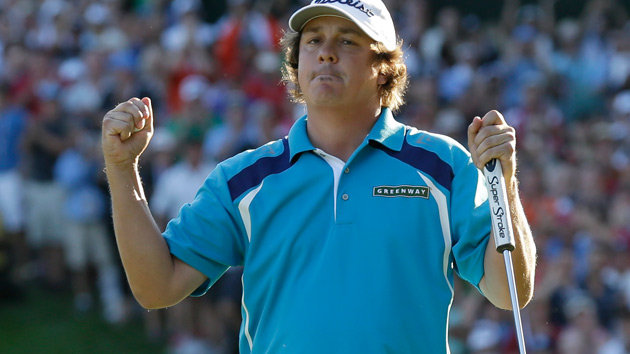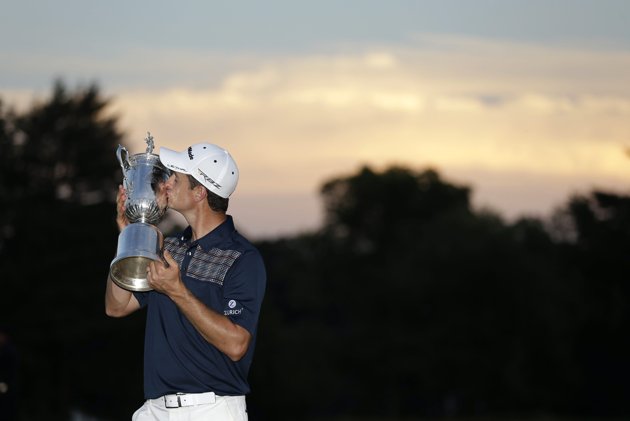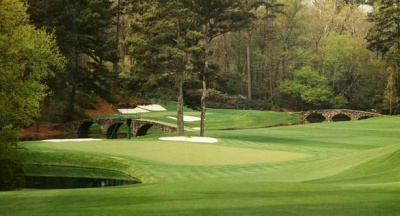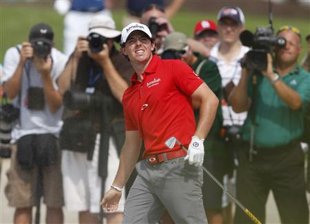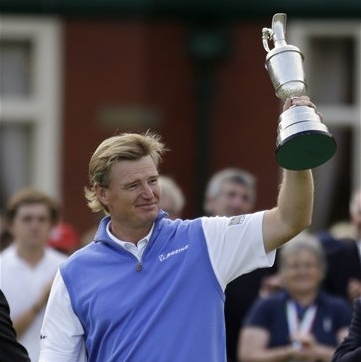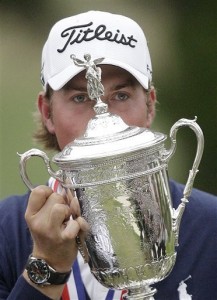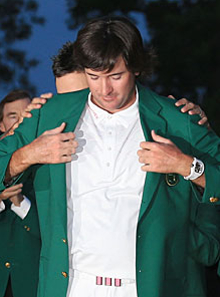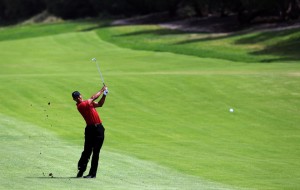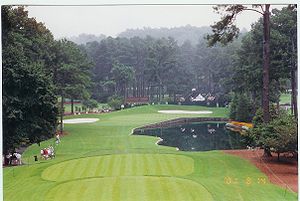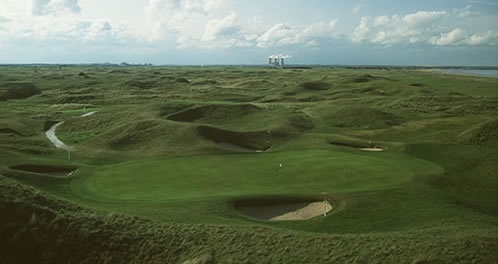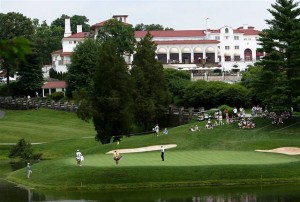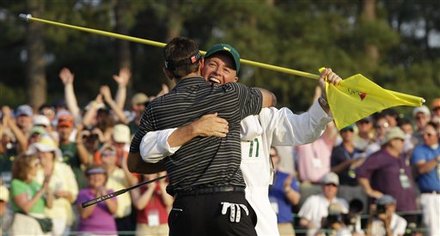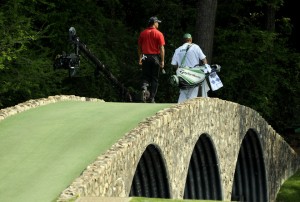PGA Golf
Dufner Tops Off Season With 1st Major
With his unkempt hair, bent-brim ballcap and whatever, dude attitude, Jason Dufner looks like he ought to be one of the clowns screaming “Bababooey!” on tee shots. Instead, he’s the guy making those shots, and now, he’s a major winner.
At 36, Dufner isn’t exactly a young gun. But the former Auburn walk-on has discovered his game in recent years, and now stands as one of the most reliable players in golf. His 2013 PGA Championship was an absolute clinic: he tied the all-time record for lowest score in a major on Friday with a 63 and clinched the victory with a near-perfect run of play throughout the weekend.
If his Sunday duel with Jim Furyk wasn’t exactly one for the ages, that’s not Dufner’s fault; after taking the lead just before the turn on Sunday, Dufner never faltered enough to let Furyk back in the door, claiming the championship by two strokes and earning the first major win of his career.
The PGA Championship is the Ringo of golf’s majors, lacking the gravitas of Augusta, the muscle of the U.S. Open, the historic spectacle of the British Open. The last time the PGA came through Oak Hill, in 2003, the winner was Shaun Micheel, a player who has never won another professional tournament. The PGA of America has resorted to painful slogans (the just-discontinued “Glory’s Last Shot”) and fan-service gimmicks (this year’s contest to select the Sunday pin placement on No. 15) in an attempt to gin up interest.
But while the tournament may not entrance golf fans, it’s still a major, which means it’s got a hammerlock on the minds of the players. Every major carries a storyline of “who needs it most?”, and both Furyk and Dufner bear recent scars from coming out on the wrong end of a battle for a major.
Two years ago almost to the day, Dufner held a five-stroke lead with four holes to play in the PGA Championship at the Atlanta Athletic Club. He bogeyed three of the final four holes and would lose to Keegan Bradley in a playoff. Last year, Furyk stood on the 16th tee on the final day of the U.S. Open holding a share of the lead and proceeded to butcher the hole and surrender a win to Webb Simpson. So, yes, you could say both of these guys were “due,” though the golf gods tend to laugh at such talk. Major championships aren’t gifts, they’re conquests.
Furyk entered the day leading, a grim omen for 2013: none of the 54-hole leaders of this year’s majors went on to win. Dufner sat a stroke back, “sat” being the operative word for the man whose very name is now synonymous in the golf world for casual, whatever happens, happens detachment.
On the outward half of the card, the games of Furyk and Dufner were mirror images of one another. Where Furyk visited every rough he could find, Dufner sighted his drives right down the center of the fairway like a fastball. Where Furyk saved himself with long putts, Dufner made highlight-reel putts unnecessary by darting approaches right at the cup. The turning point came on No. 9; with the two tied, Furyk bogeyed and Dufner birdied, spreading a two-stroke gap that would hold up for the rest of the afternoon.
Phil Caps Off Scottish, British Sweep
GULLANE, Scotland (AP) — On the day after a British Open that will be talked about for years, it was time for Muirfield to return to normal. Workers dismantled the green seats in all the grandstands. Trucks carried out supplies from the tented village. The blue name plates of players were removed from the lockers.
Still towering over the 18th green was that enormous, glorious, yellow scoreboard with all the letters and numbers in place.
”Well done, Phil. See you at Royal Liverpool.”
On the left side of the board were the names, numbers and memories of Muirfield. Phil Mickelson with a red ”3” next to his name, the only player under par. Henrik Stenson. Lee Westwood, Ian Poulter, Adam Scott. Zach Johnson, Hideki Matsuyama and – at the bottom – Tiger Woods.
Four players had a share of the lead Sunday. Twice as many looked as though they might walk away with the claret jug. It might have been one of the best, deepest leaderboards in the final round of a major in 20 years. Last one: Inverness in the PGA Championship, when Paul Azinger beat Greg Norman in a playoff, and the contenders included Nick Faldo, Vijay Singh, Tom Watson, John Cook, Lanny Wadkins, and even a young Californian named Mickelson.
Muirfield has the greatest collection of winners of any major championship – only two of its 16 champions aren’t in the Hall of Fame (one is Ted Ray, who should be). Every great course is due to have a dud for a major champion. Oakmont had Sam Parks Jr. Medinah had Lou Graham.
There was no way that was going to happen at Muirfield.
Of the nine players who had at least an outside chance on the back nine, it was a toss-up between Stenson and Hunter Mahan of those who had the least credentials. Stenson has won The Players Championship and a World Golf Championship. Mahan has two WGC titles and was playing in the final group at his second straight major.
That set the stage for Mickelson to play what he believes to be the best round of his career. By numbers alone, it was his lowest final round of a major. On a course that didn’t yield a single bogey-free round all week, Mickelson only dropped a shot at the 10th hole. The scoring average for Sunday was just under 73.5. Mickelson shot 66, matching the lowest score of the tournament. It was the lowest final round ever at Muirfield, and the lowest by an Open champion since Justin Leonard shot 65 at Royal Troon in 1997.
Smellin’ Like A Rose In Philly!
ARDMORE, Pa. (AP) — Justin Rose could see all the pieces coming together in this U.S. Open.
The sun was breaking through the clouds Sunday evening at Merion as he stood in the 18th fairway with a one-shot lead. That famous Ben Hogan plaque was in front of him, a road marker bronze that one pure swing and two putts might be all that stood between Rose and his first major championship.
That and Phil Mickelson in the final group behind him.
Rose followed his script to perfection with a par. So did Mickelson, who can’t seem to win a U.S. Open no matter how hard he tries.
Rose drilled a 4-iron just through the green and used a 3-wood to bunt the ball to an inch of the cup for par. Mickelson, who made two careless bogeys on the back nine, needed a birdie on an 18th hole that didn’t yield a single one all weekend at Merion.
”What a piece of silverware to be sitting to my right,” Rose said, gazing at the shiny trophy after closing with an even-par 70. ”It’s just an incredible experience and a childhood dream come true at this point.”
It was a recurring nightmare for Mickelson, extending his record collection of silver medals in the major he covets.
”Heartbreak,” Mickelson said on his 43rd birthday. ”This is tough to swallow after coming so close. This was my best chance of all. I had a golf course I really liked. I felt this was as good as opportunity as you could ask for. It really hurts.”
With remarkable poise and three pure swings under pressure, Rose became the first Englishman in 43 years to win America’s national championship.
Mickelson extended his U.S. Open record with his sixth runner-up finish, and this one stung. It was the first time he had the outright lead going into the final round. He holed a wedge out of deep rough for an eagle to take back the lead as he headed to the back nine.
But he flew the green with a wedge on the par-3 13th hole and made bogey on the easiest hole at Merion. He tried to hit wedge off the green on the 15th hole to give him a good shot at par, only he hit it so hard he made another bogey. And he never caught up. He wonders if he’ll ever get another chance.
“The 113th US Open” – June 13-16, 2013
Merion Golf Club, Philadelphia, PA
The Masters Tournament – April 11th-14th 2013
CBS – Masters Golf Tournament Theme Music (right click and open in new tab)
Scott First Aussie Master’s Champion
BRISBANE, Australia (AP) — The roar that followed Adam Scott’s Masters-winning putt at Augusta National could only be heard on the television broadcast so many thousand miles away on Australia’s east coast.
But distance doesn’t really matter Down Under.
Within seconds of Scott’s 12-foot putt finding the cup on the second playoff hole at Augusta, fans who had been awake since dawn Monday and were either on their way – or purposely late – to work did a lot of celebrating on their own.
Commuters cheered on buses, and car horns tooted. Even a radio interview with the prime minister on the national broadcaster was interrupted to give updates on the Masters – well before the result was known.
Golf fans everywhere in this sports-mad country rejoiced.
Shopkeepers at Peregian Beach, near a resort course designed by Adam’s father, Phil Scott, spoke of the pride of having a Masters champion from their neck of the woods.
No Australian had ever won the green jacket, although a lot had come close at Augusta. The 32-year-old Scott tied for second with fellow Australian Jason Day two years ago.
It almost seemed as though it wouldn’t happen and Greg Norman, himself on the receiving end of so many painful Masters memories, wondered if the heavens had decreed that an Australian would never win at Augusta.
Scott thought he had the Masters, and his first major title, clinched when he made a 20-foot birdie putt on the 72nd hole of regulation and was sitting in the scoring room waiting for Angel Cabrera to finish off his round in the final group Sunday.
But Cabrera produced a great shot of his own, a 7-iron to 3 feet for birdie on 18 to force a playoff.
”The golf gods can’t be this cruel to Australia,” Norman said in a text to friends who were watching nervously.
US Collapse Hands Cup To Europe
MEDINAH, Ill. – It will go down as the biggest choke in Ryder Cup history, a collapse that even considering the pressure and tension and unpredictability of this remarkable event, was so unexpected as to defy belief.
The United States, utterly dominant on the first two days of competition in this Chicago suburb, failed to hold its nerve and self-destructed on a dramatic final afternoon to allow Europe to retain the trophy, 14.5 points to 13.5.
No home team had ever surrendered a lead of this magnitude and the gap of four points heading into Sunday should have been enough to ensure a comfortable cruise for the Americans.
Instead, Europe started like a train, kept rolling, piled on some pressure – and the Americans simply could not handle it. Momentum, that sneaky phenomenon, shifted firmly in favor of the visiting team and stayed there.
“We are in shock,” said Europe’s Justin Rose, whose victory over Phil Mickelson was one of the turning points. In reality, it was the Americans who were stunned. Jim Furyk fought back tears after missing a critical putt to lose to Sergio Garcia on 18. So too did Bubba Watson and Keegan Bradley, who was unable to carry his strong pairs form into the individual format on the last day.
This was a Ryder Cup where the script was flipped for much of three days, and then completely reversed in the closing hours.
Usually it is the Europeans who display their strength and camaraderie in the pairs matches, and the U.S. who comes to the fore in the singles. When Davis Love III’s side secured a healthy advantage, there seemed to be no way back for Europe, even with the memory of the legendary Seve Ballesteros, who died of brain cancer last year and whose logo was on the European shirts, to spur it on.
Yet European captain Jose Maria Olazabal front-loaded his team in an attempt to gain some early traction, and it worked. Luke Donald was imperious in his triumph over Watson, and Ian Poulter, the MVP of this event with a perfect 4-0 record, waited until late to get the better of Webb Simpson.
Medinah Country Club, Medinah, Illinois, USA
Rory Ends Slump With Major Win At Kiawah
KIAWAH ISLAND, S.C. – As golf’s newest megastar walked slowly towards him, an 8-year-old named Bennett ambled up a tree.
The boy, from nearby Charleston, had no idea he was about to witness one of the biggest shots of the golf season. He just wanted to get a better view of Rory McIlroy’s ball.
Another pro golfer might have whined. After all, a little kid in a red hat was sitting on a branch, hanging over a second shot McIlroy had pushed way left. It was his worst shot of the day to that point, one that caused him to lean back and wince after he hit it.
But this is McIroy, Cool Hand Rory, who on his best days finds a way to win without finding a way to worry. He scanned his shot, set up, and aimed for a hole he could not see. Bennett quietly watched, close enough to leap right on top of the golfer. McIlroy swung his club and watched his shot fly toward the hole. He and Bennett were silent as the white dot disappeared from view.
Then a roar went up. And Bennett slowly started to climb down.
McIlroy’s tap-in for birdie on that second hole gave him a four-stroke lead and started a runaway eight-stroke victory for his first PGA Championship and his second major victory in two years.
It was the biggest margin of victory in the history of the major and one of the most resounding major championship finishes in memory.
McIlroy, at age 23, has now cemented himself in the “next big thing” category, as he is four months younger than Tiger Woods was when he won his second major, and only a month older than Jack Nicklaus was when he won his second. And while Woods went an entire calendar year (1998) between his first major and his second, McIlroy has his second only a little over a year after his first.
Perhaps just as impressively, McIlroy is, at age 23, only two major championships behind forty-something icons Phil Mickelson and Ernie Els.
“Just an incredible day,” he said, beaming.
The weekend was a tour de force for McIlroy, who shot 5-under in the third round and 6-under in the fourth. In a post-Escalade golf era defined by parity – there were 16 different winners of the last 16 majors coming into this weekend – McIlroy is the lone standout. He has held the lead after 54 holes in three of the last eight majors.
When he’s been right, as he was on this seaside island, he’s stunningly sure. His swing is fluid, his walk is casual, and his smile is easy. After nailing that birdie on No. 2, he went to the next tee and joked with playing partner Bo Van Pelt about spiders. He went on to birdie that hole as well.
“I felt if I could get to 12-under,” McIlroy said afterwards, “no one’s gonna catch me.”
Scott’s Collapse Hands Ernie Royal Surprise
LYTHAM ST. ANNES, England (AP) — Ernie Els felt something special could happen at the British Open, and it did.
All because of a collapse by Adam Scott that no one imagined.
Four shots ahead with four holes to play – after eight straight holes with nothing worse than par – Scott bogeyed them all and had to fight back tears on the 18th green Sunday as the magnitude of his meltdown began to sink in.
Els, who started the final round six shots behind, finished off a flawless back nine with a 15-foot birdie putt for a 2-under 68 that looked as if it would do little more than lock up another runner-up finish at Royal Lytham & St. Annes. Instead, he wound up with his second British Open – the other one was 10 years ago at Muirfield – and fourth major championship at a stage in his career when it seemed as though his best golf was behind him.
”Amazing,” Els said. ”I’m still numb. It still hasn’t set in. It will probably take quite a few days because I haven’t been in this position for 10 years, obviously. So it’s just crazy, crazy, crazy getting here.”
The celebration was muted, unlike his other three majors.
”First of all, I feel for Adam Scott. He’s a great friend of mine,” Els said. ”Obviously, we both wanted to win very badly. But you know, that’s the nature of the beast. That’s why we’re out here. You win, you lose. It was my time for some reason.”
The wind finally arrived off the Irish Sea and ushered in pure chaos – a mental blunder by Tiger Woods that led to triple bogey on the sixth hole, a lost ball by Brandt Snedeker that took him out of contention and a topped shot that made former U.S. Open champion Graeme McDowell look like an amateur.
Nothing was more stunning that what happened to Scott.
He failed to get up-and-down from a bunker on the 15th. With a wedge in his hand in the 16th fairway, he went 30 feet long and missed a 3-foot par putt. From the fairway on the 17th, he pulled his approach into thick grass left of the green. And on the final hole, he hit 3-wood to near the face of a pot bunker.
Scott still had a chance to force extra holes with a strong shot into 7 feet on the 18th for par. The putt stayed left the entire way. His chin buckled, and it looked as if he might start crying on the green. He composed himself and mouthed one word: ”Wow.”
Simpson Wins 2012 US Open At Olympic Club
SAN FRANCISCO (AP) The U.S. Open yields few birdies or big celebrations.
At Olympic Club, they always come in strange places.
Webb Simpson walked off the 18th green on a fog-filled Sunday evening with his face red and his legs limp, settling into a corner of the locker room to recover with his worried wife and watch Jim Furyk and Graeme McDowell chase his 1-over par 281 on the course.
After a week that restored the toughest test in golf, this was not the look or score of a mediocre man.
This was the 112th U.S. Open champion.
Simpson saved par from the collar around the 18th green and sweated out a pair of past champions three groups behind, becoming the latest to claim his first major title at a club that always crowns the guy nobody expects to win.
”To be honest,” Simpson said, ”I never thought about, and I never really wrapped my mind around winning.”
With the history here, he should have known better.
Olympic Club is called the ”graveyard of champions” for a reason. Proven major winners who were poised to win the U.S. Open – Ben Hogan, Arnold Palmer, Tom Watson and Payne Stewart – all lost out to the underdog. And all in a painful finish.
Perhaps it was only fitting that the 26-year-old Simpson went to Wake Forest on a Palmer scholarship.
”Arnold has been so good to me,” Simpson said. ”Just the other day, I read that story and thought about it. He’s meant so much to me and Wake Forest. Hopefully, I can get a little back for him and make him smile.”
Simpson did his part in the latest familiar chapter at a club that dates to 1860.
The North Carolina native emerged from the famous fog that blanketed the undulating Lake Course to make four birdies in a five-hole stretch around the turn on the final day, and convert a tough par from the thick grass around the tiny 18th green. He shot a 2-under 68 that created more pressure than two tested champions and a 14-time major winner wearing red could handle.
It’s “Bubba” Time At 2012 Masters
CBS – Masters Golf Tournament Theme Music (right click and open in new tab)
AUGUSTA, Ga. (AP)—Bubba Watson started the day by watching the rarest shot in golf. He ended another thrill-a-minute Sunday at Augusta National with a signature shot of his own to win the Masters.
So deep in the trees right of the 10th fairway that he couldn’t even see the green, Watson hooked a wedge off the pine needles from 155 yards to about 10 feet from the hole. That set up a par, good enough to beat Louis Oosthuizen on the second playoff hole.
“If I’ve got a swing, I’ve got a shot,” Watson said.
It was Oosthuizen who set the tone for this wild day with a double eagle— only the fourth in Masters history—on the par-5 second hole when his 4-iron from 253 yards landed on the front of the green and rolled some 90 feet into the hole for a 2.
“Somehow it fell in my hands today,” said Watson, who closed with a 68. “It’s amazing. It’s a blur, the last nine holes I don’t remember anything. Somehow I guess I cried all my tears out.”
He was blubbering hard on the 10th green, shoulders heaving, for so many reasons. Just two weeks ago, he and his wife adopted a baby boy, Caleb. The first person on the green was his mother—his father died right after the Ryder Cup in 2010. And suddenly, the powerful lefty with a million shots in the bag was a major champion.
“I never got this far in my dreams,” Watson said in Butler cabin, where defending champion Charl Schwartzel helped him into the green jacket. “It’s a blessing. To go home to my new son, it’s going to be fun.”
Oosthuizen was trying to join Gene Sarazen in the 1935 Masters as the only major champions to win with a double eagle in the final round. The former British Open champion made one clutch putt after another on the back nine, none more important than a 4-footer on the 18th for a 69 to force the playoff.
McIlroy Holds Off Surging Tiger, Now World #1
PALM BEACH GARDENS, Florida (AP)—Rory McIlroy won the Honda Classic with a performance worthy of the new No. 1 player in golf.
Right when it looked as though McIlroy had no serious challenge Sunday, Tiger Woods put some color into that red shirt with a birdie-eagle finish to shoot 62 and get within one shot of the lead.
McIlroy answered with a birdie, and then made three clutch par saves during a daunting stretch at PGA National. He closed with a 1-under 69 for the victory he needed to move to No. 1 in the world.
He is the 16th player to be atop the world ranking, and at age 22, the second-youngest No. 1 player behind Woods.
Tiger Woods shot his lowest round in 2½ years and his best closing round in PGA Tour history, a 62 at PGA National that included two eagles Sunday to make Rory McIlroy work hard to achieve the No. 1 ranking.
Woods began the final round of the Honda Classic nine strokes behind McIlroy but closed the tournament with a riveting eagle, knocking a 5-iron to 8 feet from 216 yards and holing the putt to, at the time, pull within one of McIlroy.
“It’s just building,” Woods said. “I was putting together the pieces each and every day. I wasn’t that far off, and it was just kind of building. I had a great time out there. … I’ve been hitting it like this, that’s the thing. When it got windy out there early today, I thought I hit it well late last year in Oz (Australia), same kind of condition. No reason I can’t do it again today. It all came together.”
At various points during the tournament, Woods had difficulty with his putting or with hitting the ball close enough.
But after making just one birdie through the first three rounds on the six par-5s, he eagled them both Sunday and added four birdies to shoot his lowest score since the third round of the 2009 BMW Championship — where he posted his 71st and final PGA Tour title.
The 62 was the lowest Woods has ever gone in a final round.
“I said to him on the second hole, ‘I remember being your lucky charm, you S.O.B.'” said Ernie Els, who played with Woods on Sunday. “And we had a good laugh. To me, it was the old Tiger back. The guy I finished second to all the time. It was him being him again. I don’t think he missed a shot all day.”
Woods actually could have gone lower. He had a 9-footer for birdie lip out at the sixth hole. He hit 14 of 18 greens. And his score was accomplished in blustery conditions on a day that had a two-hour weather delay.
“He hit it good all week, but today was a different level,” said Joe LaCava, Woods’ caddie. “It was awesome. It was fun. He hit every shot exactly the way he wanted to hit it — little hooks, little fades, anything he wanted.”
 The Honda Mario Andretti Indy Car – DB Lilley 3/4/12
The Honda Mario Andretti Indy Car – DB Lilley 3/4/12
2011 President’s Cup – Melbourne, Australia
MELBOURNE, Australia — The Americans returned Down Under and this time wound up on top in the Presidents Cup.
Jim Furyk became the fourth player to win all five of his matches, and the bottom half of the lineup was strong enough Sunday to give the Americans their fourth straight win in this lopsided series.
Perhaps it was only fitting that Tiger Woods clinched the cup for the second straight time.
U.S. captain Fred Couples was criticized for using a pick on Woods, who had been out with an injury most of the summer and had not won since his personal life crumbled two years ago. Woods played well all week, even if he didn’t always get rewarded with a point. In his singles match against Aaron Baddeley, he was never seriously challenged.
Woods closed out Baddeley, 4 and 3, and the celebration was on. The only thing left was for Steve Stricker in the anchor match to beat Y.E. Yang for the final score, 19-15.
“I was hoping it wasn’t going to come down to us,” Woods said. I was hoping that Stricks and I could take a victory lap back here. But we didn’t get off to a good start early. I was telling Joey (LaCava) on the range, ‘It’s probably going to come down to the last four matches.’ We needed to get our point, so we went out there and played really well today and put a lot of heat on Badds.”
Couples said Woods was ready to go all week at Royal Melbourne.
“He was ready for a month,” Couples said. “Certainly, I couldn’t answer how he was going to play, but this week I think he showed to himself that his swing is back and he’s healthy, and that’s more important to me. Obviously, we want to win the cup, but’s more important for me to have people realize that he can play the game.”
He can celebrate, too.
Woods took his turn in joining in the Fanatics, the Aussie group that goes to big sporting events. Woods even donned one of their green caps and slapped hands in the crowd.
Tiger Woods embraces captain Fred Couples after winning his match on the 15th hole on Sunday.
It was a small measure of revenge for the Americans, whose only loss came at Royal Melbourne in 1998. And it was vindication for Couples, who said a month early that he was taking Woods because he was the “best player forever.”
International captain Greg Norman got in on the debate, saying he would have taken PGA champion Keegan Bradley over Woods.
“He stepped up to the plate. He putted extremely well,” Norman said. “Any player hates to see another great player struggle, because we all know what it’s like to go through the ins and outs of the game. At the end of the day, you want to see the player who has dominated the game come back.”
As for Couples’ taking Woods over Bradley?
“I did make those comments,” Norman said. “I probably still would have gone for Keegan Bradley because he’s a major champion.”
The International team’s only win came 13 years ago at Royal Melbourne, when the Americans suffered their biggest loss in any team competition. There was no repeat this time, not even close.
The Americans led after each session, and their 13-9 lead going into the final session Sunday was too much for the International team to overcome, even with a loud and boisterous Australian crowd behind it.
Ryo Ishikawa, Charl Schwartzel, K.T. Kim and Geoff Ogilvy got the International side going. But the outcome was never seriously in doubt. Furyk, David Toms and Woods were at the bottom of the lineup, and none ever trailed.
Toms routed Robert Allenby, 7 and 5, giving the Australian a dubious distinction. He joined John Huston as the only captain’s picks to not win a single point.
Furyk, coming off his worst season since he was a PGA Tour rookie, joined Woods, Shigeki Maruyama and Mark O’Meara as the only players to record a 5-0 record in the Presidents Cup. Furyk made an eagle on the par-5 second and beat Ernie Els 4 and 3.
“I felt better about my game than what I’ve been playing this year, and I kind of want to thank my partners,” said Furyk, who won three matches with Phil Mickelson and another with Nick Watney.
Mickelson, 3-0 going into singles, conceded the first three holes to Adam Scott and conceded another hole at the eighth to fall 4 down. He rallied far too late and lost, 2 and 1.
Couples wasn’t planning on Furyk winning all his matches. Then again, nothing ever surprises him.
“We needed it. He was a leader,” Couples said. “He and Phil told me, which was very odd — I wasn’t planning on it on Tuesday night — that they wanted to play together. And they rode and rode and rode. Jimmy going 5-0 is great. It’s cool. It’s unique. It’s fun. And I think he’s happy, as the rest of the 14 guys are.”
Not so happy was an International team that can’t figure out how to win.
“It’s disappointing to not get the cup this year, but to have this event here at home, it has been a fantastic week and one I’ll remember for my whole career,” Scott said. “We played hard. I think it’s just a really demanding golf course. No matter how good you are, on this course it’s just too hard to hit the ball well to get it around here. And they might have done it just a little bit better than us this week.”
The PGA Tour Championship, FedEx Cup
September 22th-25th, 2011
ATLANTA – Bill Haas failed to win the first two playoffs he appeared in during the 2011 PGA TOUR season. But he won in his third attempt on Sunday – and the payoff was huge.
Haas beat Hunter Mahan with a par on the third extra hole to claim both the FedExCup and the TOUR Championship by Coca-Cola. With the $10 million bonus that comes with the FedExCup, Sunday’s win was worth $11.4 million.
Haas also hopes the win will be enough to convince U.S. Presidents Cup Captain Fred Couples to make him a Captain’s Pick. Couples will announce his last Captain’s Pick on Tuesday.
Haas came into this week with a longshot chance to win the FedExCup. He was ranked 25th in points and needed a handful of scenarios to play out in his favor.
Mahan was in a similar spot, having come into the week ranked 21st in points. Both players entered East Lake looking for their first win of the season.
With Webb Simpson, the FedExCup points leader, finishing in 22nd and Luke Donald, who ranked No. 4 in points, finishing in a tie for third – and the other three players in the top five not getting into contention – the scenarios worked out in their favor.
Haas shot a 2-under 68 to finish at 8 under in regulation. When Mahan parred the 18th hole to also finish at 8 under, the two had their playoff to decide both the tournament champion and the FedExCup champion.
Haas’ most important shot in the playoff came after his approach at the par-4 17th dribbled into the water to the right of the green. Most of the ball was above the water line – “an unbelievably fortunate break” Haas said later – and he hit a tremendous shot to within 3 feet to save his par and force another hole.
“I thought I had one on the second playoff hole and then he hits it out of the water to two feet,” Mahan said. “It seemed like he was destined to win this week.”
Haas seemed to have control of the tournament in regulation when he birdied the par-4 15th to move to 10 under. At one time, he held a three-shot lead.
But he bogeyed two of his last three holes to open the door for others to take their shots.
Jason Day was at 8 under through 16 holes but he bogeyed the final two holes to eventually fall into a tie for sixth.
“Obviously I’m a little disappointed that I bogeyed the last two holes,” Day said, “but I was trying to win out there.”
K.J. Choi came to the 18th hole needing a birdie to get to 8 under but could not find the green with his tee shot. Aaron Baddeley also came to the 18th needing a birdie but couldn’t roll in his birdie putt from 34 feet.
Luke Donald made birdie at the 18th to move to 7 under. Had he been able to finish in solo third instead of a three-way tie for third, he would’ve won the FedExCup.
“I guess this is what the FedExCup is all about,” Donald said. “It’s meant to be exciting.”
Had Baddeley been able to win the tournament, Simpson – despite his low finish — would have won the FedExCup.
“A little disappointed I didn’t play any better, but I’m pretty tired right now and it’s kind of shown in my golf game this week,” Simpson said.
The 93rd PGA Championship
August 11th-14th, 2011
Atlanta Athletic Club, Jones Creek, GA, USA
Rookie Wins PGA Championship Playoff
JOHNS CREEK, Ga. (AP)—A rally that ranks among the best. A collapse hardly anyone saw coming. There was even a guy in a red shirt Sunday, pumping his fists with each clutch putt in the final, frenzied hour of the PGA Championship.
In a major filled with unfamiliar names, Keegan Bradley delivered an unforgettable finish.
Bradley was five shots behind with only three holes to play after his chip shot raced across the 15th green and into the water, leading to a triple bogey. That’s when he reminded himself that no lead was safe on the final four holes at Atlanta Athletic Club.
“I just kept telling myself, ‘Don’t let that hole define this whole tournament,”’ Bradley said.
Instead, it led to one of the most stunning turnarounds in a major. Bradley made back-to-back birdies, including a 35-footer with a belly putter that rattled into the cup on the 17th.
Then came a monumental meltdown by Jason Dufner. Unflappable all afternoon, he hit his tee shot in the water on the 15th for the first of three straight bogeys that led to a three-hole playoff.
Bradley birdied the 16th hole in the playoff—his first outright lead of the day—and went on to win by one shot.
The son of a PGA professional in Vermont, wearing red for his alma mater— St. John’s—Bradley became only the third player in at least 100 years to win a major championship in his first try.
The Wanamaker at his side, Bradley took out his cell phone and took a picture of the oversized trophy. It wasn’t long before he posted it on Twitter with three hash tags—“pgachampion. triplebogies. happiness.”
“It feels unbelievable,” he said. “It seems like a dream and I’m afraid I’m going to wake up here in the next five minutes and it’s not going to be real.”
The final major of the year was hard to believe in so many ways.
It was Bradley, a 25-year-old PGA Tour rookie who was ranked No. 108 in the world, who ended America’s longest drought in a major that had reached six. He became only the third player in at least 100 years to win a major on his first try.
All this after Tiger Woods missed the cut and finished out of the top 100 for the first time in a major, and U.S. Open champion Rory McIlroy—the favorite at the PGA—hit a tree root in the opening round and played the rest of the week with his right wrist heavily taped. He tied for 64th and finished 19 shots behind.
Then came the finish—a rousing rally for Bradley, a sad collapse for Dufner. It brought back memories of Ed Sneed making bogey on the last three holes of the 1979 Masters, and even Arnold Palmer losing a seven-shot lead with nine holes left in the 1966 U.S. Open.
Dufner played that four-hole finish in 3 under for the week—never once making a bogey—until the final round.
Sunday was different. He made three bogeys in regulation, another on the 17th in the playoff to fall two shots behind, and a birdie on the last hole in the playoff only made the score seem closer than it was. Dufner, now winless in 148 starts, closed with a 69.
“Everybody has struggled on them,” Dufner said of the final four holes. “Unfortunately, I had the lead and I struggled on them. … That was the deciding factor, and Keegan made a couple birdies there, and I made a couple bogeys.”
Bradley, best known until now as the nephew of LPGA great Pat Bradley, moved to No. 29 in the world. He won earlier this year at the Byron Nelson Championship in a playoff, again after the leader faded on the closing holes.
The win makes it seven straight majors by players who had never before captured a Grand Slam event, the longest streak ever.
Bradley, who became the first major champion to use a long putter, can only hope more will follow.
“I don’t want to be one of the guys that kind of disappears,” Bradley said. “I would love to be up in a category with the best players and be mentioned with Phil Mickelson, one of my idols. I hope I don’t disappear. I don’t plan to.”
Mickelson had been the last American to win a major at the 2010 Masters, and perhaps it was only fitting that one of his proteges ended the drought. Mickelson has been playing money games during practice rounds at the big tournaments with Bradley, wanting him to be prepared to play for something more prestigious than cash. The kid must have taken the lessons to heart.
He never gave up when he had every reason to do just that.
“This guy’s the guttiest player I’ve ever worked for,” said his caddie, Steven “Pepsi” Hale. “There’s no quit.”
Bradley was two shots behind when he arrived at the pivotal stretch of the course. From left of the 15th green, he hit an aggressive chip that came out too hot and rolled into the water, leading to a triple bogey.
Dufner watched it all unfold from high on the hill as he waited on the 15th tee, his lead suddenly up to four shots over Anders Hansen, who was in the process of making bogey. For the first time all day, Dufner showed a trace of emotion, wincing slightly when he saw the flight of his tee shot take the ball into the water right of the green.
He still poured in a 12-foot putt to at least escape with bogey. His lead was still four shots, and when he split the middle of the 16th fairway, he seemed to be on his way.
Then came an unlikely chain of events.
Bradley stuffed his shot into 8 feet for birdie on the 16th. Behind him in the final group, Dufner hit into the right bunker, blasted out to 10 feet and made bogey. Now his lead was down to two shots.
Dufner arrived on the 17th tee in time to watch as Bradley rattled in a 35-foot putt, pumping his fists as his caddie stood behind the hole holding the flag over his head with both arms. Dufner did well to find the middle of the green for what appeared to be a safe two-putt par. But he ran his first putt 10 feet by the hole and three-putted for bogey.
Just like that, they were tied.
With the pressure as great as it had been all day, both played the 18th the same way—dry. Both had long two-putts for par from one side of the green to the other. They finished at 8-under 272.
Dufner’s 5-iron on the opening hole of the playoff—the uphill 16th—came within an inch of hitting the hole and stopped 6 feet away. Bradley answered with a shot into 4 feet and made the birdie, while Dufner missed his putt.
On the 17th, Dufner again three-putted for bogey to give Bradley a two-shot lead going to the 18th. The final drama for Bradley was watching his 6-iron descend toward the green, clearing the lake with not much room to spare. Dufner rolled in a birdie, but by then it was too late to recover from his mistakes.
“I’m so new at this situation, I don’t know if I appreciate it as much as I will—soon,” Dufner said. “I might look back in 10 or 15 years and be disappointed if I never get another chance.”
They finished one shot ahead of Hansen, whose lone bogey of the final round — on the 16th hole—kept him out of the playoff. The Dane closed with a 66, matching the best score of the final round.
The group tied for fourth included 2001 champion David Toms (67) and two others who stayed in the game until the very end.
Robert Karlsson got within one shot of the lead with a 5-foot eagle putt on the 12th hole. The Swede never made another birdie, though, and finished with three straight bogeys for a 67. Scott Verplank holed out a bunker shot on the 16th and was tied with Bradley going to the 17th, but his tee shot bounced off the wall and into the water for a double bogey. He closed with a 70. Doug Ferguson, AP
“The 140th British Open” – July 14-17, 2011
Royal St. Georges Golf Club, Kent, England
20th Try A Charm For Darren Clarke
SANDWICH, England (AP)—Another major goes to Northern Ireland. The surprise was Darren Clarke’s name on the claret jug.
Ten years after he last contended in a major, no longer in the top 100 in the world, Clarke delivered his defining moment Sunday in the British Open when he held off brief challenges from Phil Mickelson and Dustin Johnson to win golf’s oldest championship.
The weather was so wild that heavy rain changed to sunshine, back and forth all afternoon, while the wind was relentless.
Northern Irish golfer Darren Clarke celebrates after winning the British Open for his first major title.
(Getty Images)
Clarke was a steady presence through it all.
A 20-foot eagle putt on the seventh hole gave him the lead for good, and he didn’t drop a shot until it no longer mattered. With bogeys on the last two holes, Clarke closed with an even-par 70 for a three-shot victory over the two Americans.
“Pretty amazing right now,” Clarke said, the claret jug at his side. “It’s been a dream since I’ve been a kid to win the Open, like any kid’s dream is, and I’m able to do it, which just feels incredible.”
Northern Ireland had gone 63 years without a major. Now it has three of the last six—Graeme McDowell in the U.S. Open last year at Pebble Beach, followed by Rory McIlroy at the U.S. Open in a record performance last month at Congressional, and now the 42-year-old Clarke.
“Northern Ireland…… Golf capital of the world!!” McIlroy tweeted as Clarke played the last hole.
“We’re blessed to have two fantastic players in Rory and GMac, and I’ve just come along, the only guy coming along behind them,” Clarke said. “We have fantastic golf courses, we have fantastic facilities, but to have three major champions from a little, small place in a short period of time, it’s just incredible.”
They are so close that a week after McIlroy won the U.S. Open, Clarke pulled out of a tournament in Germany so he could return to Northern Ireland and join the celebration.
They were always for someone else. Clarke had reason to believe his best celebrations were behind him. Surely, nothing could top playing a Ryder Cup on home soil in Ireland five years ago and leading Europe to victory just one month after his wife, Heather, died of cancer.
“In terms of what’s going through my heart, there’s obviously somebody who is watching down from up above there, and I know she’d be very proud of me,” Clarke said. “She’s probably be saying, ‘I told you so.”’
Indeed, this was overdue.
No one had ever gone more than 15 starts in the British Open until winning, and this was the 20th try for Clarke. Yet even as he struggled with his game and the adjustment of raising two boys without their mother, and as the spotlight shifted to youth, Clarke never gave up on his dreams.
“I always believed I would get myself back up here,” he said before heading out to the 18th green to collect the oldest trophy in golf. “I always believed I had enough talent to challenge and win one.”
He delivered on the demanding links of Royal St. George’s to hold off Mickelson and Johnson.
Mickelson, rarely a threat in this major, made up a five-shot deficit in seven holes and was only one shot behind after a birdie on the 10th until he started missing short putts. He shot 38 on the back nine, hitting his final approach into the grandstand.
Then it was Johnson’s turn. In the final group of a major for the third time in six years, Johnson made two birdies early on the back nine and was only two shots behind when his second shot to the par-4 15th went out of bounds, ending his hopes again.
The last hour was a coronation for Clarke, long a popular figure not only in Europe but around the world. Puffing away at cigarettes as he barreled down the fairways, he never looked to be in any trouble.
And the few times he did, the golfing gods came to the rescue. He twice hit shots that were headed for pot bunkers well short of the green, only to hop over them or around them, keeping him in control.
He posed with the claret jug that was empty, but not for long. He promised some “nice, Irish black stuff” by evening. And when asked about the celebration, Clarke promised only that it would be “long.”
“And I’ll be very, very hungover,” he said.
He finished at 5-under 275 and became the first player in his 40s to win a major since Vijay Singh at the 2004 PGA Championship. Only two other players were older than Clarke when they won their first major—Roberto De Vicenzo (44) in the 1967 British Open, and Jerry Barber (45) in the 1961 PGA Championship.
For the Americans, their longest drought without a major since the Masters began in 1934 will continue at least until the PGA Championship next month. They had plenty of contenders, from Mickelson to Johnson to Rickie Fowler and Anthony Kim, but none came through.
Mickelson’s problems started on the par-3 11th, when he missed a par putt from just inside 3 feet.
“It was just a dumb, mental error,” Mickelson said. “I just lost focus there, and it hurts to throw shots away like that when I’m behind.”
He wound up with a 68, which felt more like a 78, and had his seventh runner-up finish in a major.
It might have been more devastating for Johnson, who never lost his composure even as he fell four shots behind on the front nine. Johnson made a 6-foot birdie on the 10th and a 15-foot birdie on the 12th to get within two shots.
Just like that, it was all over.
Johnson had an 8-foot birdie attempt at No. 13 as Clarke went over the green. Instead of a potential two-shot swing, however, Clarke saved yet another par, and Johnson missed his putt. From the middle of the 14th fairway, Johnson tried to lay up with a 2-iron, playing a draw back toward the flag. The wind caught it and took it beyond the white stakes, and Johnson hung his head and dropped another ball in the fairway.
It was another wasted opportunity—the 82 in the final round of the U.S. Open with a three-shot lead, then taking a two-shot penalty on the last hole of the PGA Championship when he didn’t realize he was in a bunker.
“The more I put myself in this situation, the better,” said Johnson, who closed with a 72. “The more I learn, the more I understand my game and what happens in this situation.”
Thomas Bjorn, who threw away the British Open in a bunker on the 16th hole eight years ago, acquitted himself nicely. He never got closer than three shots all day, but his 71 put him in fourth place and at least earned him a trip back to the Masters next year.
Chad Campbell (69), Kim (70) and Fowler (72) tied for fifth.
Clarke won for the second time this year—he beat a weak field in Spain that was opposite The Players Championship—and goes to No. 30 in the world. He had been No. 111, the lowest-ranked player to win a major since Shaun Micheel in 2003 at the PGA.
“The 111th US Open” – June 16-19, 2011
Congressional Country Club, Bethesda, MD
Rory McIlroy Runs Away With US Open Title
BETHESDA, Md. — The proof of Rory McIlroy’s remarkable resiliency was the silver trophy at his side and the pages of a record book that he changed during four mind-boggling days at the U.S. Open.
For his father, it was a phone call right after a most crushing collapse at Augusta National two months ago.
Poised to fulfill his potential and become the youngest Masters champion since Tiger Woods, McIlroy shot 80 in a final round that was painful to watch. Gerry McIlroy, who worked three jobs so his son could pursue his passion, was home in Northern Ireland when the phone rang some 20 minutes after it was over.
Fair or not, Rory McIlroy’s life has already changed as he may now be seen as The Next Tiger Woods, Gene Wojciechowski writes.
Thanks to his dominant U.S. Open victory, Rory McIlroy can shed his best-player-without-a-major baggage, Bob Harig writes.
“I said, ‘Rory, are you OK, son?’ Because you always fear for your kids,” the father said Sunday. “And he says, ‘Dad, um, I have no problem with it at all. I hit a few bad shots. And if you play golf, then you’ll understand that.’ ”
The father had his country’s flag draped over a green shirt during a momentous celebration at Congressional on Sunday.
McIlroy, the 22-year-old who can make golf look easy even in the toughest of circumstances, buried that Masters memory the way he buried his competition in a breathtaking performance filled with the promise of more majors to come.
“I felt like I got over the Masters pretty quickly. I kept telling you guys that, and I don’t know if you believed me or not. But here you go,” McIlroy said, gesturing to the shiny prize on the table. “Nice to prove some people wrong.”
Four days of flawless golf finally ended when McIlroy polished off a 2-under 69 to shatter U.S. Open records that simply defy logic at the major known as the toughest test in golf.
The combined scores of the last 10 U.S. Open champions were 14-under par.
McIlroy was 16 under.
He finished eight shots ahead of Jason Day, whose score of 8-under 276 would have been enough to win 26 of the last 30 U.S. Opens.
“It’s just phenomenal golf,” Day said. “He lapped the field, and for such a young age, how mature he is. Golf right now is in a really, really good spot where Rory McIlroy is right now.”
McIlroy nearly holed an impossible putt from the front of the 18th green to within a foot, and it was then he finally saw his father. He smiled and shook a clenched fist, and after tapping in for par, walked off the green and into his arms.
“Happy Father’s Day,” McIlroy told him.
It was the second straight U.S. Open title for the tiny country of Northern Ireland, and defending champion Graeme McDowell walked back across the bridge to the 18th green to embrace the new winner.
“You’re a legend,” McDowell told him.
Not many would dispute that now, not after a week like this.
Golf had been looking for a star ever since Woods’ personal life and formidable game spiraled out of control 18 months ago. This was supposed to be the “U.S. Wide Open” because parity had taken over.
McIlroy, who goes to No. 4 in the world, now stands above everyone going into the final two majors of the year.
“Nothing this kid does ever surprises me,” McDowell said. “He’s the best player I’ve ever seen. I didn’t have a chance to play with Tiger when he was in his real pomp, and this guy is the best I’ve ever seen. Simple as that. He’s great for golf. He’s a breath of fresh air for the game, and perhaps we’re ready for golf’s next superstar.
“And maybe,” he said, “Rory is it.”
This was more than just one major. It was the way McIlroy decimated the field with a golf swing so pure that he had only four holes worse than par all week.
McIlroy finished at 268 to break the U.S. Open record by four shots. That record 12-under par by Woods at Pebble Beach? McIlroy matched it in the second round and kept right on rolling.
“I couldn’t ask for much more, and I’m just so happy to be holding this trophy,” McIlroy said. “I know how good Tiger was in 2000 to win by 15 in Pebble. I was trying to go out there and emulate him in some way. I played great for four days, and I couldn’t be happier.”
He even tried to be like Woods in the final round, showing no mercy on those chasing him.
McIlroy opened with an 8-foot birdie and never let anyone get closer to him the rest of the day. Even when he made his first bogey of the final round at No. 12 that trimmed his lead back to eight shots with six holes to play, he wasn’t happy. Woods kept his focus at Pebble Beach by trying not to drop a single shot. That’s what the kid was trying to do.
“I was trying to go out and trying to make no mistakes, and really not give anyone a chance to catch me,” McIlroy said.
When he arrived for his press conference, he took a picture of the silver U.S. Open trophy on the table and posted it on Twitter with two references that said it all: Winning. Bounceback.
“Going back to Augusta this year, I felt like that was a great opportunity to get my first major. It didn’t quite work out,” McIlroy said. “But to come back straightaway at the U.S. Open and win, that is nice. You can always call yourself a major champion, and hopefully after this, I can call myself a multiple major champion.”
Since the Masters began in 1934, McIlroy is the second youngest major champion next to Woods. At 19 years 315 days, John McDermott is the youngest U.S. Open champion, having won the 1911 tournament.
Day, a 23-year-old from Australia, closed with a 68 and was runner-up for the second straight major. Unlike the Masters, however, Day didn’t have a chance. No one did this week.
McIlroy opened with a three-shot lead, stretched it to six shots after 36 holes and eight shots going into the final round. No one got any closer over the final 18 holes.
Tributes poured in throughout the steamy afternoon outside the nation’s capital — first from the players he beat, then from Jack Nicklaus and ultimately from Woods.
“What a performance from start to finish,” Woods said in a statement. “Enjoy the win. Well done.”
Nicklaus invited McIlroy to lunch last year in Florida and talked to him about how to close out tournaments. He apparently wasn’t listening when he took a four-shot lead into the final round of the Masters, only to implode on the back nine and shoot 80.
“I didn’t think it was going to happen again, and it hasn’t,” Nicklaus said by telephone to NBC Sports. “I think this kid’s going to have a great career. I don’t think there’s any question about it. He’s got all the components. He’s got a lot of people rooting for him. He’s a nice kid. He’s got a pleasant personality.
“He’s humble when he needs to be humble, and he’s confident when he needs to be confident.”
Just think: If he had avoided the collapse at Augusta National, he could be headed to Royal St. George’s for the British Open with the first two legs of the Grand Slam.
McIlroy also tied Woods’ record for a six-shot lead at the halfway point, and he joined Lee Janzen in 1993 and Lee Trevino in 1968 as the only players to post all four rounds in the 60s.
Some of that had to do with Congressional, which was softened by rain and cloud cover. The USGA did nothing to try to protect par, moving tees forward to tempt players to take on some risk. The result was a whopping 32 rounds under par on Sunday. The previous record of 18 final rounds under par was at Baltusrol in 1993.
But there is no denying that one guy played far better than anyone else — eight shots better. McIlroy became the first player since Woods in 2002 at Bethpage Black to go wire-to-wire in the U.S. Open without ties, and his best might still be ahead of him.
“I think he’s still growing, and it’s just scary to think about it,” said Y.E. Yang, who played in the final group the last two days.
Amid the celebration of McIlroy came growing concern about the state of American golf. For the first time since the Masters began in 1934, Americans have gone five majors without winning. They were on the verge of being shut out of the top three for the fourth time in the last five majors until Yang made bogey on the last hole for a 71.
That put the South Korean into a tie for third with PGA Tour rookie Kevin Chappell (66), Robert Garrigus (70) and Lee Westwood (70).
“It says, I think, that the Americans struggle a little bit,” PGA champion Martin Kaymer said. “Since Tiger has been on a — how you do say? — little down, nothing has really happened. We’ve just become so much stronger.”
The game also is getting much younger.
McIlroy became the fourth straight player in his 20s to win a major, the longest such streak since 1897.
The drama Sunday was not who would win, but by how many.
There was simply no catching McIlroy, not when he was staked to an eight-shot lead while playing flawless golf, not on a soft course that allowed him to hit wedge into six greens on the front nine.
With chants of “Let’s go, Ror-eee” coming from the massive gallery, and teenagers climbing pine trees to see golf’s bright new star, McIlroy came out firing with a wedge that settled 8 feet from the pin for an opening birdie.
Twice when he faced putts from across the green, he holed 7-footers for par. He stretched his lead to 10 shots, and when he made the turn, his tee shot on the par-3 10th rolled down the slope and stopped inches away from an ace.
The way his week had been going, it was shocking not to see it fall.
The Masters Tournament – April 7th-10th
CBS – Masters Golf Tournament Theme Music (right click and open in new tab)
South African Schwartzel Takes Green Jacket
AUGUSTA, Ga. (AP)—They say the Masters doesn’t truly begin until the back nine on Sunday. This one? Epic nuttiness.
So many lead changes you needed motion sickness pills to watch the scoreboard. A meltdown that makes Greg Norman’s heartbreak look good. And madness that went on right to the very end, until Charl Schwartzel made four straight birdies to end the hopes of all those players who’d had a chance to win it in the final two hours.
“There were so many numbers going up and down. It must have looked great on TV,” said Jason Day, who finished two strokes behind Schwartzel. “It was exciting stuff, it really was.”For those who lost track of the leaderboard, here’s a rundown of some of the wackiness:
THE RUSH TO BUTLER CABIN: Despite a shaky front nine, Rory McIlroy had a 1-stroke lead as he walked to the 10th tee. All he had to do was make pars, and the green jacket would be his as a mere 21-year-old. But McIlroy, who still remembers Nick Faldo being gifted the Masters title by Norman in ’96, collapsed in spectacular fashion.
He pulled his tee shot into the trees left of the fairway, and the ball apparently ricocheted between two of the club’s famous cabins. McIlroy had no choice but to punch it back out, but then yanked his approach shot left of the green, near a scoreboard, before banging a shot off a tree limb.
He finally chipped it onto the green—barely. Two putts left him with a 7, and his lead was now a 2-shot deficit.
McIlroy could have survived it, but he three-putted for another bogey on No. 11. After a four-putt double-bogey on 12, the collapse was complete. After leading the first three days, the Northern Irishman wasn’t even on the leaderboard when the afternoon ended. He closed with an 80, finishing 10 strokes behind Schwartzel.
“I just hit a poor tee shot on 10 and unraveled from there,” McIlroy said. “I’ll have plenty more chances, I know that. It’s just very disappointing what happened today.”
TIGER’S ROAR: The roars were echoing through the pines like the old days as Tiger Woods reeled off four birdies and an eagle for a 31 on the front nine. Never mind his erratic game or the fact he hadn’t won since that infamous car crash 16 months ago. When he made the turn with a share of the lead, almost everyone expected him to tear through the back nine, dropping his challengers one by one.
But Woods isn’t quite his old self yet. A 3-footer for par should have been a gimme, but Woods banged it off the back of the cup for a bogey on No. 12. With a chance to take the outright lead on the par-5 15th, he missed another short putt for an eagle. He still made birdie, but on this wildest of days, it may as well have been a bogey for all the good it did him.
He would play his last three holes at par, and didn’t even bother sticking around for the finish.
BIRDIE STRING: Schwartzel running off four straight birdies was bigger, because they got him a green jacket. But Geoff Ogilvy made five in a row on Nos. 12 through 16 to jump to the top of the leader board.
“When I birdied 14, I thought I was in pretty good shape,” Ogilvy said.
But the Australian couldn’t go any lower, and there were still five groups playing when he finished. Ogilvy would finish at 10-under, tied for fourth with Woods and Luke Donald.
DONALD’S COMEBACK: The Par 3 Tournament winner has never gone on to win the green jacket, and that dubious streak sure looked safe when Luke Donald dunked his tee shot in the water on 12. Instead of being two shots off the lead, he was now four back.
But wait. Birdies on 15 and 16 got Donald within one shot of Adam Scott, only to give a stroke back on 17. When his tee shot on 18 landed on the right edge of a bunker, leaving him a lie only a stork could love, Donald was out of the mix.
Or was he?
Hitting off one leg, Donald’s ball came out perfectly only to hit the flag and carom back off the green. But Donald chipped in from the fairway, the ball bouncing several times on the green before dropping in to put Donald back at 10 under, one shot back.
“I dug in deep and made some birdies coming in,” Donald said, cheers of “LUUUUUKE!” still ringing in his ears. “But I think I’m going to come up a little bit short.”
THE AUSSIES: Adam Scott grabbed the outright lead for the first time with an 8-foot birdie putt on the 14th, giving all of Australia hope that its oh-fer at Augusta National might finally be over.
No way any lead was going to hold up for four holes on this day, however, and, sure enough, Scott’s second shot on 15 rocketed behind the grandstand. He managed a par, then stuffed his tee shot to 2 feet on the par-3 16th to take back the lead.
Meanwhile Day, his playing partner and fellow Aussie, had been stuck at 10-under for what seemed like an eternity on a day when the leaderboard was on spin cycle. (It was only three holes, actually.) But he made a long putt for a birdie on 17, then rolled in an 8-footer for another on 18. Suddenly he, too, was at 12 under with Scott.
But they were out of holes, and Schwartzel had just made a 10-footer to take the lead by himself. When the South African put his approach shot to a mere 20 feet, leaving him two shots to win the green jacket, Scott, Day and all of their fellow Aussies could only shake their heads again.
“I hung in there as long as I could,” Scott said. “Obviously, I can’t control Charl. When you birdie the last four holes at the Masters and you’re around the lead, that usually wins.”
It did.
